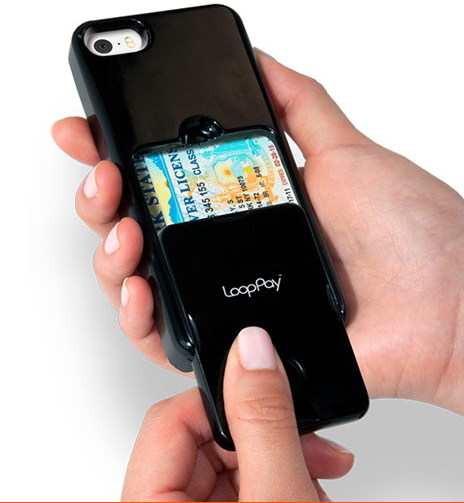Samsung Jumps Into Smartphone Pay Arena With LoopPay Acquisition
Samsung acquired LoopPay in a bid to compete with Apple Pay. Apple Pay has been making a lot of noise lately; since it launched, it has gained widespread use with banks, businesses and even the U.S. government. As a result, many companies are trying to create or refine services to compete with Apple.
Last week, Google announced a new service called Plaso that will help it compete with Apple Pay, and Square announced that it's developing a new product of its own.
LoopPay uses a case that is compatible with many smartphones on the market today. The case has NFC technology as well as the ability to function with magnetic card readers. This ability to be used with existing credit card reading technology will help ease adoption when it's used with Samsung's phones, as it essentially works just like a regular credit card.
Samsung entered negotiations with LoopPay in December to work on a combined effort, but it appears that Samsung simply decided to buy them out.
Although it isn't clear how Samsung will utilize the technology from LoopPay, we will probably see in the near future. There might be sharp competition if Google and Samsung manage to get their pay programs up around the same time, however.
Apple Pay is only for Apple devices, which essentially gives the company universal adoption amongst its iPhone customers, with no competition. Samsung and Google won't have this advantage when their pay programs start rolling out, and this could result in the Android market being heavily divided.
Samsung likely has an advantage over Google, as it doesn't require retailers to do anything for LoopPay to work. With Apple Pay's popularity growing quickly, though, competing companies will need to start making their moves soon.
Get Tom's Hardware's best news and in-depth reviews, straight to your inbox.
Follow us @tomshardware, on Facebook and on Google+.
-
therealduckofdeath Funny that you make the impression that Samsung haven't offered a built in payment system before. They've used PayPal for quite a while. I guess I can understand why they want to distance themselves from PayPal though, as the software PayPal offers is extremely unpolished and buggy.Reply -
schultzter The thing to consider is that LoopPay's technology is primarily for the US market where magnetic cards are still much more popular than chip & PIN cards. In most other countries the reader will refuse the magnetic strip if your card is known to have a chip & PIN.Reply
And liability shift in the USA is starting this year, so more and more retailers will be installing chip & PIN (and NFC) readers. Which makes this technology obsolete before they even get it built into a phone!!!
I would actually avoid buying a Samsung phone with this technology. Based on my past experience (I have an GS3) and the way they keep trying to re-surface their apps even though I have alternatives and I've done my best to disable their bloatware. -
jayis I may sound like a bit of a conspiracy nut, but I personally like the strips because it requires me to pull out the card and utilize it myself. I've still heard of vulnerabilities regarding NFC based technologies, mostly regarding the fact they can be pinged by a passerby with a portable receiver, and some with higher powered ones that can allow slight distances such as across a room unless you have one of them special card sleeve/pockets. Though they could just wait in a restaurant or store for people to pull out cards to get them.Reply
I am not 100% up to date on NFC and security regarding the cards utilizing chip & PIN, so I could be factually out of date or incorrect at this point. It was a bit of a scare a while ago when I was introduced to this concept. So feel free to correct me. -
therealduckofdeath @shultzter, please enlighten us about a smartphone that doesn't promote bloatware from the manufacturer? Apple does this, Microsoft does the same and also Google on their Nexus devices. But somehow, it's suddenly a problem for you because it's Samsung?Reply -
Rattenmann What is the gain from using this tech over my current card?Reply
The same data is given to the shops. So no security increase there.
But now my data is on my card AND my phone. So twice as many possibilities to loose my card infos, or get it stolen.
I am confused what the value of that actually is. -
ericburnby LoopPay is DOA. They are planning on adding tokens sometime this year (as the banks come on board), so for the time being all it's doing is just broadcasting your mag strip from your card.Reply
And LoopPay is carefully choosing their words. They claim 90% of the POS terminals will work with their system, but they aren't saying what percentage of actual cards will work (as shultzter stated above, cards with chips won't work and will be refused by the terminal).
And just like Apple Pay (another system using the newest token system), LoopPay will have to wait until the banks start updating their software. Which means some LoopPay users will get excellent security from tokens, while others get no security at all. How are they going to explain this to customers (or will they simply not talk about it)?
